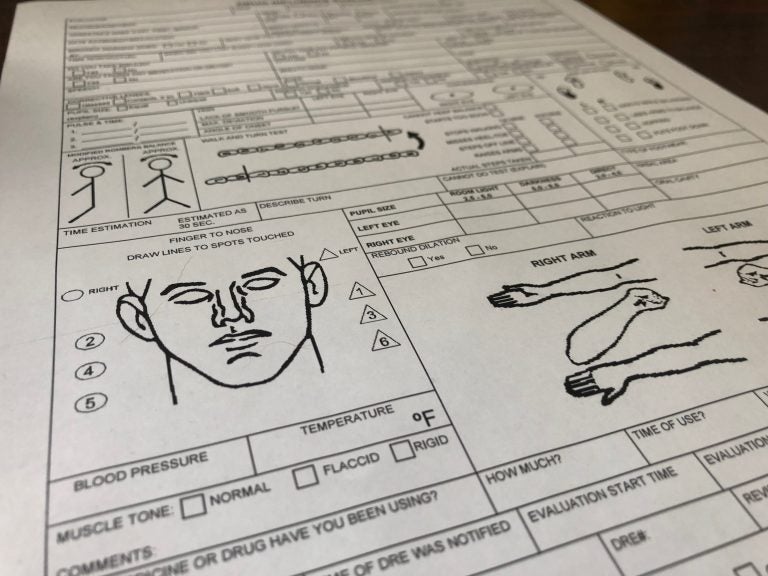N.J. Supreme Court weighs scientific merit of methods cops use to spot intoxicated drivers
For the first time, N.J.’s high court is hearing a challenge to the scientific merits of the methodology cops use to spot and charge drivers under the influence of drugs.

The drug recognition expert "face sheet" is what DRE officers fill out during their evaluation of a suspect they believe may be impaired by drugs. (Joe Hernandez/WHYY)
The New Jersey Supreme Court is deciding whether to take a closer look at a methodology long used by police officers to charge people with driving under the influence of drugs.
Law enforcement officials say the protocol is crucial to securing drugged driving convictions since toxicology tests for drugs are unreliable. But defense attorneys and civil rights advocates argue the method is not based on science and should be banned as expert testimony in court.
The state’s highest court heard arguments Tuesday in the case of a Denville man, Michael Olenowski, who claims evidence from two “drug recognition experts” was unfairly used to secure two intoxicated driving convictions against him.
Also known as DREs, the specialized police officers are trained to identify the physical signs of drug intoxication by using a series of assessments, including standard field sobriety tests, such as the one-leg stand.
The high court will decide whether to appoint a special master to oversee a so-called Frye hearing — a typically months-long process where both sides present scientific evidence and expert witnesses — into the DRE methodology.
It’s the first time the court is hearing a challenge to the scientific merits of the methodology, used by more than 520 DREs in New Jersey. The state, which already has the second-largest contingent of DREs in the country, wants to boost its ranks as the state considers legalizing recreational marijuana.
New Jersey Deputy Attorney General Sarah C. Hunt argued Tuesday that there was no need for such a hearing because many states had already reviewed the nationally-recognized DRE methodology and deemed it reliable.
“We’ve reached critical mass,” Hunt said. “There’s simply no need to replay the same hearings over and over in every state, when this issue has been decided using the same protocol, using the same tests, and likely many of the same experts in so many of our sister states.”
Hunt also argued that DRE testimony is not scientific, but rather specialized knowledge that police officers get through training and experience.
But ACLU attorney Alex Shalom argued that since DRE practitioners do use science to justify the credibility of their methods, the protocol deserves to be scrutinized as such.
“‘Scientific’ doesn’t mean the person needs to wear a white lab coat. It’s not who is making the decisions,” he said. “‘Scientific’ means does it rely on the scientific method: observation, hypothesis, testing, iteration? That’s exactly what the DRE protocol does.”
The court did not say when it would issue a ruling.
WHYY is your source for fact-based, in-depth journalism and information. As a nonprofit organization, we rely on financial support from readers like you. Please give today.




